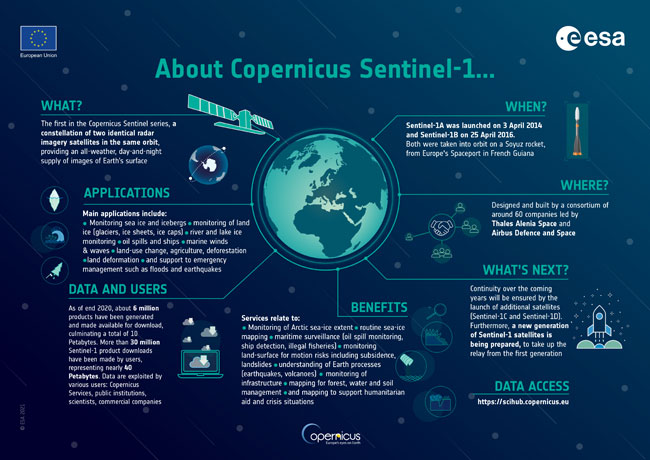What is Sentinel 1?

The Sentinel-1 mission is a joint European Commission (EC) and European Space Agency (ESA) program called the European Radar Observatory for Copernicus (ESA). Copernicus is a European initiative to provide environmental and security-related information services. It is based on data from Earth Observation satellites and information from the ground.
Sentinel-1 uses C-band imaging in four different imaging modes, each with different resolutions (down to 5 m) and spatial coverage (up to 400 km). It has dual-polarization(VV, VH, HH) capability, quick revisit times, and quick product delivery. Precision measurements of spacecraft location and attitude are provided for each observation.
Synthetic Aperture Radar (SAR) benefits from operating at wavelengths that are not hampered by cloud cover or a lack of illumination, unlike in Sentinel-2 images. It can collect data over locations irrespective of an external light source at any day or night time, in all weather. With its C-SAR equipment, Sentinel-1 can provide dependable, repeatable wide-area monitoring.
The mission consists of Sentinel-1A and Sentinel-1B satellites that share the same orbital plane.
Sentinel-1 operates in a pre-programmed, conflict-free mode, capturing high-resolution images of all global landmasses, coastal zones, maritime routes, and vignettes covering the whole ocean. Sentinel 1 images provide operational service reliability and a consistent long-term data archive for applications dependent on lengthy-time series.
| CHARACTERISTIC | DESCRIPTION |
|---|---|
| Design life | 7 Years (consumables for 12 years) |
| Orbit |
|
| Mean Local/Solar Time | 18:00 at Ascending Node |
| Orbital Period | 98.6 Minutes |
| Max Eclipse Duration | 19 Minutes |
| Attitude Stabilisation | 3 Axis Stabilised |
| Attitude Accuracy | 0.01 deg (each axis) |
| Nominal Flight Attitude |
|
| Attitude Profile | Geocentric and Geodetic |
| Operative Autonomy | 96 hours |
| Launch Weight | 2,300 kg |
| Dimensions (stowed) | 3,900 x 2,600 x 2,500 mm^3 |
| Solar Array Average Power | 5,900 W (End-of-Life) |
| Battery Capacity | 324 Ah |
| Spacecraft/Availability | 0.998 |
| Science Data/Storage Capacity | 1,410 Gigabits (End-of-Life) |
| S-Band TT&C Data Rates | 4 kbps TC; 16/128/512 kbps ™ (programmable) |
| X-Band Downlink/Data Rate | 2 x 260 Mbps |
| Launcher | Soyuz from Kourou |
I have taken most of content from Copernicus ESA site. Please if you have any suggestions feel free to write in the comment sections, I will be following them.

kampus jatim | General Comment
May 23, 2023, 7:29 p.m.
Thanks for sharing this useful information! Hope that you will continue with the kind of stuff you are doing.